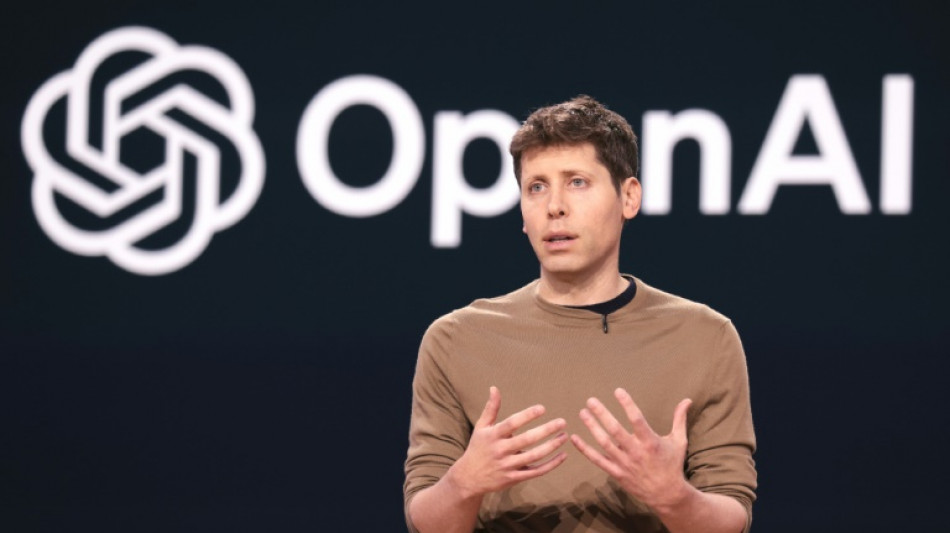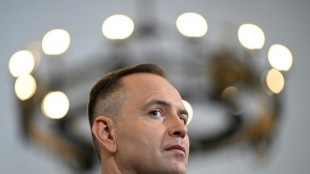
-
 Alleged Bondi shooters holed up in hotel for most of Philippines visit
Alleged Bondi shooters holed up in hotel for most of Philippines visit
-
Japan govt sued over 'unconstitutional' climate inaction

-
 US approves $11 billion in arms sales to Taiwan: Taipei
US approves $11 billion in arms sales to Taiwan: Taipei
-
England battle to save Ashes as Australia rip through top-order

-
 Guarded and formal: Pope Leo XIV sets different tone
Guarded and formal: Pope Leo XIV sets different tone
-
What to know about the EU-Mercosur deal

-
 Trump vows economic boom, blames Biden in address to nation
Trump vows economic boom, blames Biden in address to nation
-
Conway 120 as New Zealand in command at 216-0 against West Indies

-
 Taiwan eyes fresh diplomatic ties with Honduras
Taiwan eyes fresh diplomatic ties with Honduras
-
ECB set to hold rates but debate swirls over future

-
 Asian markets track Wall St lower as AI fears mount
Asian markets track Wall St lower as AI fears mount
-
EU holds crunch summit on Russian asset plan for Ukraine

-
 Australia PM vows to stamp out hatred as nation mourns youngest Bondi Beach victim
Australia PM vows to stamp out hatred as nation mourns youngest Bondi Beach victim
-
Australian PM vows hate speech crackdown after Bondi Beach attack

-
 Turkmenistan's battle against desert sand
Turkmenistan's battle against desert sand
-
Ukraine's Zelensky in Poland for first meeting with nationalist president

-
 England in disarray at 59-3 in crunch Test as Lyon, Cummins pounce
England in disarray at 59-3 in crunch Test as Lyon, Cummins pounce
-
Japan faces lawsuit over 'unconstitutional' climate inaction

-
 Migrants forced to leave Canada after policy change feel 'betrayed'
Migrants forced to leave Canada after policy change feel 'betrayed'
-
What's next for Venezuela under the US oil blockade?

-
 Salvadorans freed with conditional sentence for Bukele protest
Salvadorans freed with conditional sentence for Bukele protest
-
Brazil Congress passes bill to cut Bolsonaro prison term

-
 Cricket Australia boss slams technology 'howler' in Ashes Test
Cricket Australia boss slams technology 'howler' in Ashes Test
-
New Zealand 83-0 at lunch on day one of third West Indies Test

-
 Ecuadorean footballer Mario Pineida shot and killed
Ecuadorean footballer Mario Pineida shot and killed
-
US government admits liability in deadly DC air collision

-
 1933 Industries Announces Maturity of Unsecured Convertible Debentures and Encourages Conversion to Support Continued Growth
1933 Industries Announces Maturity of Unsecured Convertible Debentures and Encourages Conversion to Support Continued Growth
-
Ex-podcaster Dan Bongino stepping down as deputy FBI director

-
 Real Madrid scrape past third-tier Talavera in Spanish Cup
Real Madrid scrape past third-tier Talavera in Spanish Cup
-
Hunt for US college mass shooter drags into fifth day

-
 Cherki inspires Man City, Newcastle strike late to reach League Cup semis
Cherki inspires Man City, Newcastle strike late to reach League Cup semis
-
Barcelona, Lyon and Chelsea reach Women's Champions League quarters

-
 Venezuela reacts defiantly to US oil blockade, claims exports unaffected
Venezuela reacts defiantly to US oil blockade, claims exports unaffected
-
Nasdaq tumbles on renewed angst over AI building boom

-
 S.Africa expels Kenyans working on US Afrikaner 'refugee' applications
S.Africa expels Kenyans working on US Afrikaner 'refugee' applications
-
US Congress ends Syria sanctions

-
 Cherki inspires Man City cruise into League Cup semis
Cherki inspires Man City cruise into League Cup semis
-
Billionaire Trump nominee confirmed to lead NASA amid Moon race

-
 Mahomes undergoes surgery, could return for 2026 opener: Chiefs
Mahomes undergoes surgery, could return for 2026 opener: Chiefs
-
Melania Trump steps into spotlight in Amazon film trailer

-
 Brazil Senate advances bill that could cut Bolsonaro jail term
Brazil Senate advances bill that could cut Bolsonaro jail term
-
Safonov hero as PSG beat Flamengo in Intercontinental Cup

-
 Oscars to stream exclusively on YouTube from 2029
Oscars to stream exclusively on YouTube from 2029
-
Oscars to stream exclusively on YouTube from 2029: Academy

-
 CNN's future unclear as Trump applies pressure
CNN's future unclear as Trump applies pressure
-
Brazil threatens to walk if EU delays Mercosur deal

-
 Zelensky says Russia preparing for new 'year of war'
Zelensky says Russia preparing for new 'year of war'
-
Rob Reiner's son appears in court over parents' murder

-
 US Congress passes defense bill defying Trump anti-Europe rhetoric
US Congress passes defense bill defying Trump anti-Europe rhetoric
-
Three Russia-themed anti-war films shortlisted for Oscars

| SCS | 0.12% | 16.14 | $ | |
| RBGPF | -2.23% | 80.22 | $ | |
| RYCEF | 1.48% | 14.86 | $ | |
| RELX | -0.64% | 40.56 | $ | |
| RIO | 1.55% | 77.19 | $ | |
| GSK | -0.14% | 48.71 | $ | |
| NGG | 1.8% | 77.16 | $ | |
| BTI | -0.21% | 57.17 | $ | |
| BCE | -0.78% | 23.15 | $ | |
| CMSC | -0.34% | 23.26 | $ | |
| BP | 2.06% | 34.47 | $ | |
| CMSD | -0.43% | 23.28 | $ | |
| JRI | -0.6% | 13.43 | $ | |
| VOD | 0.86% | 12.81 | $ | |
| BCC | 0.59% | 76.29 | $ | |
| AZN | -1.66% | 89.86 | $ |

Is AI's meteoric rise beginning to slow?
A quietly growing belief in Silicon Valley could have immense implications: the breakthroughs from large AI models -– the ones expected to bring human-level artificial intelligence in the near future –- may be slowing down.
Since the frenzied launch of ChatGPT two years ago, AI believers have maintained that improvements in generative AI would accelerate exponentially as tech giants kept adding fuel to the fire in the form of data for training and computing muscle.
The reasoning was that delivering on the technology's promise was simply a matter of resources –- pour in enough computing power and data, and artificial general intelligence (AGI) would emerge, capable of matching or exceeding human-level performance.
Progress was advancing at such a rapid pace that leading industry figures, including Elon Musk, called for a moratorium on AI research.
Yet the major tech companies, including Musk's own, pressed forward, spending tens of billions of dollars to avoid falling behind.
OpenAI, ChatGPT's Microsoft-backed creator, recently raised $6.6 billion to fund further advances.
xAI, Musk's AI company, is in the process of raising $6 billion, according to CNBC, to buy 100,000 Nvidia chips, the cutting-edge electronic components that power the big models.
However, there appears to be problems on the road to AGI.
Industry insiders are beginning to acknowledge that large language models (LLMs) aren't scaling endlessly higher at breakneck speed when pumped with more power and data.
Despite the massive investments, performance improvements are showing signs of plateauing.
"Sky-high valuations of companies like OpenAI and Microsoft are largely based on the notion that LLMs will, with continued scaling, become artificial general intelligence," said AI expert and frequent critic Gary Marcus. "As I have always warned, that's just a fantasy."
- 'No wall' -
One fundamental challenge is the finite amount of language-based data available for AI training.
According to Scott Stevenson, CEO of AI legal tasks firm Spellbook, who works with OpenAI and other providers, relying on language data alone for scaling is destined to hit a wall.
"Some of the labs out there were way too focused on just feeding in more language, thinking it's just going to keep getting smarter," Stevenson explained.
Sasha Luccioni, researcher and AI lead at startup Hugging Face, argues a stall in progress was predictable given companies' focus on size rather than purpose in model development.
"The pursuit of AGI has always been unrealistic, and the 'bigger is better' approach to AI was bound to hit a limit eventually -- and I think this is what we're seeing here," she told AFP.
The AI industry contests these interpretations, maintaining that progress toward human-level AI is unpredictable.
"There is no wall," OpenAI CEO Sam Altman posted Thursday on X, without elaboration.
Anthropic's CEO Dario Amodei, whose company develops the Claude chatbot in partnership with Amazon, remains bullish: "If you just eyeball the rate at which these capabilities are increasing, it does make you think that we'll get there by 2026 or 2027."
- Time to think -
Nevertheless, OpenAI has delayed the release of the awaited successor to GPT-4, the model that powers ChatGPT, because its increase in capability is below expectations, according to sources quoted by The Information.
Now, the company is focusing on using its existing capabilities more efficiently.
This shift in strategy is reflected in their recent o1 model, designed to provide more accurate answers through improved reasoning rather than increased training data.
Stevenson said an OpenAI shift to teaching its model to "spend more time thinking rather than responding" has led to "radical improvements".
He likened the AI advent to the discovery of fire. Rather than tossing on more fuel in the form of data and computer power, it is time to harness the breakthrough for specific tasks.
Stanford University professor Walter De Brouwer likens advanced LLMs to students transitioning from high school to university: "The AI baby was a chatbot which did a lot of improv'" and was prone to mistakes, he noted.
"The homo sapiens approach of thinking before leaping is coming," he added.
P.Mathewson--AMWN



